.jpg?width=667&height=334&name=iStock-809822820(1).jpg)
Loneliness is a growing epidemic. Approximately 42.6 million adults over age 45 in the United States are estimated to be suffering from chronic loneliness, according to AARP’s Loneliness Study, and the American Psychological Association reports that loneliness and social isolation may represent a greater public health hazard than obesity.
A new Florida State University College of Medicine study confirms the heavy toll that loneliness can take on your health: It increases your risk of dementia by 40 percent.
What Does ‘Lonely’ Mean?
Being alone and being lonely aren’t the same, and there are many interpretations of what lonely means. Also, not everyone experiences loneliness in the same situations.
In the study, which was published in the Journal of Gerontology: Psychological Sciences, researchers defined loneliness as "the subjective experience of social isolation.”
“It’s a feeling that you do not fit in or do not belong with the people around you,” Angelina Sutin, the principal investigator on the study, said in a press release. “You can have somebody who lives alone, who doesn’t have very much contact with people, but has enough — and that fills their internal need for socializing. So even though objectively you might think that person is socially isolated, they don’t feel lonely.
“The flip side,” Sutin continued, “is that you can be around a lot of people and be socially engaged and interactive and still feel like you don’t belong. From the outside, it looks like you have great social engagement, but the subjective feeling is that you’re not part of the group.”
Why Is It Bad for You?
Research shows that people who feel lonely have more health problems, feel worse, and perhaps die at an earlier age. The Florida State study is not the first to show that loneliness is associated with an increased risk of dementia, but it is the largest study that confirms it. The study involved data from 12,000 participants collected over 10 years
There are a number of ways that loneliness may put one at risk for dementia, including:
- Physiological: Individuals who feel lonely are likely to have several risk factors for dementia, including diabetes and hypertension. Higher inflammation, the body's natural response to infection, can be harmful when it lasts a long time
- Behavioral: People may cope with loneliness through behaviors that can damage the brain, such as heavy drinking or being sedentary.
- Social: A lack of meaningful social interaction is an important risk factor for cognitive decline.
What Should You Do?
You don’t need a new prescription to treat loneliness. Ultimately, loneliness is a signal that your social needs are not being met. Not surprisingly, the current recommended treatment revolves around establishing social relationships.
“Loneliness is a modifiable risk factor,” Sutin said. "Most people might describe periods where they felt lonely and then periods where they didn't feel lonely. So just because you feel lonely now, you don't always have to feel this way."
As seniors age, living alone can lead to loneliness, isolation, and depression, and driving usually becomes more difficult at some point. Living in an assisted living community allows access to activities, outings, and more. Living in a community allows residents to build and maintain relationships with others their own age who have similar interests.
Residents are also able to develop new inter-generational relationships with those providing care and support for them. Your loved one may not be the most outgoing person, but having even one friend can prevent the downward spiral that occurs when isolated.






